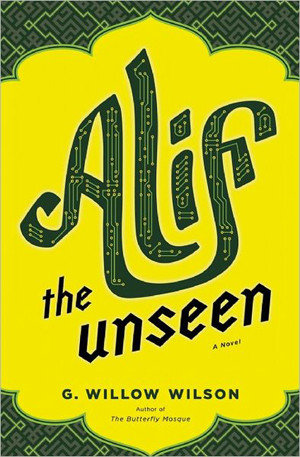Say the word Islam and what words come to mind? Extremism, violence, complexity, anger? Not surprising, particularly in the wake of the violence that erupted following the publicity around that god-awful trailer, “Innocence of Muslims.” And of course, it’s a bad rap that is far removed from the religion’s actual teachings.
But would you think of words like “fantastical,” “surreal,” “mysterious” and “magical”? Probably not.
Unless, that is, you’ve wandered off the beaten track to discover G. Willow Wilson’s delightful first novel Alif the Unseen.
Wilson is an award-winning graphic novelist based in both Cairo and Seattle. Her books Air, Vixen and Cairo, have received critical acclaim, as did her meticulous and honest memoir, The Butterfly Mosque.
Her first novel moves the American author into exciting territory where she brings together the mystical elements of Islam and the hardcore digital age that helped topple dictators in the Middle East. In fact, the book — which predicts revolution in an unnamed Arab country — was completed just before protests in Cairo’s Tahrir Square would lead to President Hosni Mubarek’s ouster.
But equally as brilliant, Wilson explores not just the revolutionary spirit that simmers beneath the surface of these tightly controlled societies, struggling to keep up with modernity’s freedoms, but also the ongoing class warfare that is really the essence of the final push back against tyrannies of elites sopping up the countries’ riches while their people — and guest workers — barely get by.
The hero of the tale epitomizes the sharp dichotomy in societies like Dubai or Saudi Arabia where rich elites grab all they can, but are in essence truly supported by a disenfranchised underclass of migrant workers who watch the glitter and glitz from behind dirty windows in cramped apartments. Alif, the book’s protagonist, is of mixed race. His Arab father abandoned his Indian mother, to spend more time with his other wife. He is bitter about this and what it means for him — neither fully a “real” citizen, nor fully able to connect with other South Asians. He is caught in that space inhabited by so many people in a globalized world where nationalities are not finite and evolve with the endless movements and migrations of peoples searching for freedoms, political or economic or both.
“Back in his room, he examined himself in the mirror. Indian and Arab blood had merged pleasantly on his face, at least. His skin was an even bronze colour. His eyes took after the Bedouin side of his family. . . yes, pleasant enough, but he would never pass for a full blooded Arab.” And for Alif, this distinction makes it impossible for the love of his life, an aristocratic young woman, to publicly become his wife.
Besides, he doesn’t have a real job. Alif is a dedicated hacker who protects his clients — political dissidents, arms dealers, Islamists — from State surveillance. Try explaining that one to the parents.
A star-crossed love affair in the middle of political and digital upheaval would be enough, but Wilson’s inclusion of Islamic understandings of the “unseen world” of spirits, known as Jinn (think Genie), adds a twist to the book that brings it closer to science fiction than mere political tome, or romantic adventure. And although an Aladdin figure comes into play, the jinni in this story are far more threatening and fantastical than any modern representation of these mysterious creatures who Muslims believe are created out of smokeless fire (Satan, for example, is considered to be one of them). Like human communities, there exist both good and bad jinni and those in between.
Wilson’s geography is mapped out beautifully, and the reader travels easily with the characters — representing the various types of people that one comes across in the Arab world — between the visible and the invisible. Wilson’s lucid writing includes minute and lyrical details in every scene and moment, making the story believable despite its fantastical subject matter.
This book is both timely and prescient and a welcome addition to a literary field that is in its infancy. Muslim writers writing fictional works for mainstream consumption are hard to come by. Reading one this good should not be passed up.—Amira Elghawaby
Amira Elghawaby is a contributing editor at rabble.



